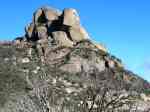In the 1860s, alluvial gold prospecting and mining extended along the Ovens River, easterly from Brigh,
with several dredges in operation until about 1919.
Small settlements evolved in the area, along the Harrietville road, such as Wandiligong (3 km from Bright),
Freeburgh 4.8 km, Germantown 5.2 km, and Smoko 16.3 km.
The first school was at Freeburgh, opened in 1865. By 1948 enrollments had fallen to four, and the building
was moved to the Myrtleford school.
In 1915, a new bridge was built over the Ovens River at Germantown, which survives to the present day,
as the crossing on the Mt Tawonga Rd
A rough track leads westerly just over the bridge to the site of Sloan's Timber Mill.
Today, a Camping and and Holiday Cabins Park is located on the south side of the highway, at Freeburgh.

